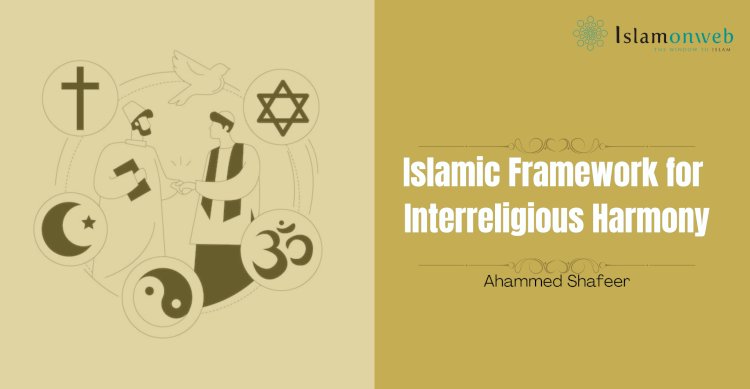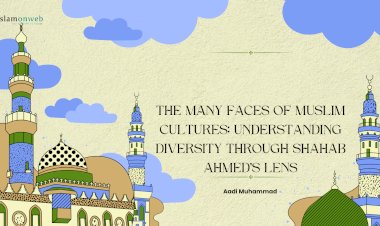Peaceful Coexistence: The Islamic Framework for Interreligious Harmony
Interreligious dialogue has remained a recurring topic of discussion, especially in today’s increasingly tense global atmosphere, where ethnic and communal conflicts frequently erupt due to misunderstandings and adversarial mindsets toward other communities. Although all major religious traditions advocate for harmonious coexistence, communal tensions persist and have become a pressing concern across various societies. History has witnessed numerous communal conflicts, and some continue to this day, such as the aggression in Iraq, Iran, and Afghanistan, the systematic repression of Uyghur Muslims, and the anti-Rohingya sentiment in Myanmar.
In such a challenging context, it is essential to identify effective strategies to reduce and mitigate interreligious tensions in the broader interest of humanity. This essay primarily seeks to explore the Islamic stance on this issue, with a focus on the guidance offered by the Qur’an and Sunnah.
Islam, being a universal and leading religion, is often denounced due to the heinous acts of terrorism, resulting in numerous casualties, unfairly attributed to it. The accusations Islam faces in this regard are disproportionately higher than those levelled against other religions. Blaming Islam for terrorist acts gained traction in the late 20th century, especially after the 9/11 attacks, which sparked a sustained hate campaign against Islam and the Muslim community worldwide. This led to widespread misunderstandings, particularly fuelled by Western narratives.
Eventually, this bias developed into a broader phenomenon known as Islamophobia—a prejudiced fear and hostility towards Islamic symbols and the Muslim community. But should Islam be censured in this way?
It is crucial to examine Islam’s actual outlook on interreligious dialogue and its approach toward followers of other faiths. Islam, in fact, consistently promotes love, tolerance, and compassion toward all human beings, regardless of their religious or communal affiliations. While people may be identified by their ethnic, religious, or cultural backgrounds, their origin remains one and the same.
The Qur’an clearly states:
يَـٰٓأَيُّهَا ٱلنَّاسُ إِنَّا خَلَقْنَـٰكُم مِّن ذَكَرٍۢ وَأُنثَىٰ وَجَعَلْنَـٰكُمْ شُعُوبًۭا وَقَبَآئِلَ لِتَعَارَفُوٓا۟ ۚ إِنَّ أَكْرَمَكُمْ عِندَ ٱللَّهِ أَتْقَىٰكُمْ ۚ إِنَّ ٱللَّهَ عَلِيمٌ خَبِيرٌۭ
"O humanity! Indeed, We created you from a male and a female and made you into peoples and tribes so that you may (get to) know one another. Surely the most noble of you in the sight of Allah is the most righteous among you. Allah is truly All-Knowing, All-Aware." (Al-Ḥujurāt, 49:13)
Accordingly, Islam calls for a humane and respectful engagement with all people, not just Muslims. The Qur’an describes the Prophet ﷺ as raḥmatan lil-ʿālamīn—a mercy to the worlds (Al-Anbiyā’, 21:107)—indicating that he was sent not for a particular group, but for all of humanity. Islam has always advocated an inclusive and constructive approach to interaction among diverse communities.
Islam cannot be imposed on anyone of other beliefs, as the religion is not one to be embraced through compulsion.
Qur’anic Explanation of Peaceful Coexistence
The Qur’an upholds the Islamic concept of inclusiveness. It states:
يَـٰٓأَيُّهَا ٱلنَّاسُ ٱتَّقُوا۟ رَبَّكُمُ ٱلَّذِى خَلَقَكُم مِّن نَّفْسٍۢ وَٰحِدَةٍۢ وَخَلَقَ مِنْهَا زَوْجَهَا وَبَثَّ مِنْهُمَا رِجَالًۭا كَثِيرًۭا وَنِسَآءًۭ ۚ وَٱتَّقُوا۟ ٱللَّهَ ٱلَّذِى تَسَآءَلُونَ بِهِۦ وَٱلْأَرْحَامَ ۚ إِنَّ ٱللَّهَ كَانَ عَلَيْكُمْ رَقِيبًۭا
"O humanity! Be mindful of your Lord Who created you from a single soul, and from it He created its mate, and through both He spread countless men and women. And be mindful of Allah—in Whose Name you appeal to one another—and honour family ties. Surely Allah is ever Watchful over you." (Sūrat al-Nisā’, 4:1)
This verse, beginning with the salutation "yā ayyuhā al-nās" (O mankind)—which includes non-believers—presents a comprehensive and unique concept of human unity by emphasising the shared origin of all humanity.
Furthermore, the Qur’an states:
وَلَوْ شَآءَ رَبُّكَ لَجَعَلَ ٱلنَّاسَ أُمَّةًۭ وَٰحِدَةًۭ ۖ وَلَا يَزَالُونَ مُخْتَلِفِينَ
"Had your Lord so willed, He would have certainly made humanity one single community of believers, but they will always choose to differ." (Sūrat Hūd, 11:118)
This suggests that the existence of different religions and beliefs is part of Allah’s divine plan. Therefore, showing the highest level of courtesy and respect to others is an obligation upon Muslims, as diversity is a sign of Allah’s wisdom and mercy.
The Qur’an also outlines the manner of dialogue:
ٱدْعُ إِلَىٰ سَبِيلِ رَبِّكَ بِٱلْحِكْمَةِ وَٱلْمَوْعِظَةِ ٱلْحَسَنَةِ ۖ وَجَـٰدِلْهُم بِٱلَّتِى هِىَ أَحْسَنُ ۚ إِنَّ رَبَّكَ هُوَ أَعْلَمُ بِمَن ضَلَّ عَن سَبِيلِهِۦ ۖ وَهُوَ أَعْلَمُ بِٱلْمُهْتَدِينَ
"Invite (all) to the Way of your Lord with wisdom and kind advice, and only debate with them in the best manner. Surely your Lord alone knows best who has strayed from His Way and who is rightly guided." (Sūrat al-Naḥl, 16:125)
This verse instructs the Muslim community to engage others with wisdom, good counsel, and respectful dialogue. It implies that the means of Islamic propagation are intellectual and ethical—wisdom, gentle speech, and good conduct, not coercion or violence. Such methods foster mutual understanding and respect among people.
In another verse, the Qur’an clearly states:
"There is no compulsion in religion." (Sūrat al-Baqarah, 2:256)
Imām al-Ṭabarī, in his Tafsīr, clarifies that Muslims have no right to impose their religion on anyone by force. Accepting Islam is a matter of personal choice and inner conviction.
Moreover, the Qur’an provides guidance on how to interact with people of other faiths:
لَّا يَنْهَىٰكُمُ ٱللَّهُ عَنِ ٱلَّذِينَ لَمْ يُقَـٰتِلُوكُمْ فِى ٱلدِّينِ وَلَمْ يُخْرِجُوكُم مِّن دِيَـٰرِكُمْ أَن تَبَرُّوهُمْ وَتُقْسِطُوٓا۟ إِلَيْهِمْ ۚ إِنَّ ٱللَّهَ يُحِبُّ ٱلْمُقْسِطِينَ
"Allah does not forbid you from dealing kindly and fairly with those who have neither fought you because of religion nor driven you from your homes. Surely Allah loves those who are fair." (Sūrat al-Mumtaḥanah, 60:8)
This verse clearly discourages hostility toward non-believers unless they exhibit open aggression. It encourages believers to practise justice and kindness in their dealings with others.
Prophetic Examples of Interreligious Harmony
The Sunnah of the Prophet ﷺ provides numerous examples of dialogue and interaction between Muslims and non-Muslims. He lived among people of various beliefs—Christians, Jews, idolaters, and even atheists—and maintained social and economic relations with them, even before his prophethood. This conduct earned him the title al-Amīn (the Trustworthy), as recorded in Sīrah Ibn Hishām.
After prophethood, his compassionate approach toward other communities continued. One well-known incident is that of a woman who used to throw thorns along the path where the Prophet ﷺ would walk. He would quietly remove them without cursing or scolding her, demonstrating patience and mercy.
Another striking example is his journey to Ṭā’if for the propagation of Islam. There, he was rejected and severely persecuted. When Jibrīl عليه السلام offered to crush the people of Ṭā’if between the two mountains, the Prophet ﷺ replied:
“No. Rather, I hope that Allah will bring from their descendants people who will worship Allah alone without associating any partners with Him.”
(Ṣaḥīḥ al-Bukhārī 3231)
He ﷺ also said:
الخَلْقُ عِيالُ اللَّهِ، فأحَبُّ الخَلْقِ إلى اللَّهِ أنفَعُهُمْ لِعِيالِهِ
“All creatures are Allah’s dependents, and the most beloved of them to Allah is the one who is most beneficial to His dependents.”
(Al-Bayhaqī, Shuʿab al-Īmān)
This hadith reflects a profound ethical principle that transcends religious boundaries, emphasising service to all of humanity.
The Prophet ﷺ also taught the Muslim community to exercise self-restraint when mistreated. As narrated by ʿUrwah ibn al-Zubayr, the Prophet ﷺ was once sitting with his wife, ʿā’ishah, and some companions. A group of Jews passed by and mockingly said, "As-sāmu ʿalayka" (Death be upon you). The Prophet ﷺ remained silent. However, ʿĀ’ishah responded angrily, saying: "ʿAlaykum wa laʿnatullāh wa ghaḍabullāh ʿalaykum" (May the curse and anger of Allah be upon you too). The Prophet ﷺ calmly advised her:
“O ʿĀ’ishah, Allah loves gentleness.”
(Ṣaḥīḥ al-Bukhārī 6024)
As raḥmatan lil-ʿālamīn (a mercy to the worlds), the life of the Prophet ﷺ serves as a guiding light for all humanity, offering benefits regardless of one's religious background.
Taking care of people was one of the Prophet’s ﷺ highest priorities. He maintained excellent relationships with his neighbours, regardless of their ethnic or religious identity.
Abū Dharr al-Ghifārī narrated that the Prophet ﷺ said:
“O Abū Dharr! When you cook broth, add more water to it so that you can offer some to your neighbour.”
(Ṣaḥīḥ Muslim, 2625)
He also strongly opposed any aggression or injustice against dhimmīs (non-Muslims living under Islamic rule). There are several clear examples of the Prophet ﷺ defending the rights of dhimmīs and warning against any form of hostility towards them.
ʿAbdullāh ibn ʿUmar narrated:
“He who oppresses a dhimmī, imposes a tax on him beyond his capacity, takes something from him without his consent—I will stand against him on the Day of Judgment.”
(Sunan Abī Dāwūd, 3052)
And in another narration reported by the same companion:
“He who hurts a dhimmī has hurt me, and whoever hurts me, hurts Allah.”
(Sunan Abī Dāwūd, 3053)
These ḥadīths clearly demonstrate the Prophet’s ﷺ protection of dhimmīs and his concern for justice and fairness, even for non-Muslims under Muslim rule.
The society established in Madinah by the Prophet ﷺ stands as a practical model of interfaith coexistence. After establishing the Islamic state, he drafted an inclusive constitution that granted all religious groups the freedom to observe their own prayers and religious duties. He entered into formal agreements with the Jewish tribes living in Madinah to ensure proper governance and peaceful administration. The lives, wealth, and dignity of all residents were protected under Islamic rule.
Importantly, non-Muslims were never forced to be judged by Islamic law in Madinah. They were permitted to live according to their own religious laws.
Abū Hurayrah narrated that a group of Jewish scholars came to the Prophet ﷺ, informing him that one of their people had committed adultery and seeking his judgement. The Prophet ﷺ ruled on the matter according to Jewish scripture.
(Ṣaḥīḥ al-Bukhārī, 6841)
All these examples from the Sunnah reinforce Islam's compassionate and respectful stance toward other faith communities. They encourage Muslims to coexist peacefully with others and to reject hatred and hostility.
In conclusion, although Islam continues to face criticism due to heinous acts wrongly attributed to it, the Holy Qur’an and Sunnah consistently urge the Muslim community to engage with followers of other faiths with justice and generosity. The Qur’an firmly discourages hostility against others without cause, and the Prophet ﷺ explicitly opposed violence toward non-Muslims. His life offers numerous examples promoting peaceful coexistence, mutual respect, and cooperation with people of other beliefs.
If the teachings of the Qur’an and the Prophetic approach are sincerely implemented, hatred, enmity, mistrust, and communal tensions can be significantly reduced, paving the way for a more harmonious and inclusive global society.
About the author:
Ahammed Shafeer is currently graduating from the Islamic Daʿwa Academy in Akode, specialising in Qur’anic Sciences. He is also pursuing a Bachelor's degree in English Language and Literature at SGO University, Kollam.
References
- Khattab, M. (Trans.). (n.d.). The Clear Quran. Retrieved from https://quran.com/en
(Surah Al-Ḥujurāt, 49:13)
(Surah Al-Anbiyā’, 21:107)
(Surah Al-Nisā’, 4:1)
(Surah Hūd, 11:118)
(Surah Al-Naḥl, 16:125)
(Surah Al-Baqarah, 2:256)
(Surah Al-Mumtaḥina, 60:8) - Ibn Hishām. (n.d.). Al-Sīrah al-Nabawiyyah (Biography of the Prophet). Retrieved from https://islamfuture.files.wordpress.com/2009/12/sirat-ibn-hisham-biography-of-the-prophet.pdf
- Al-Bayhaqī. (n.d.). Shuʿab al-Īmān. Retrieved from https://archive.org/details/ShuabUlIman
- Al-Bukhārī. (n.d.). Ṣaḥīḥ al-Bukhārī (Ḥadīths 6024 & 6841). Retrieved from https://sunnah.com/
- Muslim. (n.d.). Ṣaḥīḥ Muslim (Ḥadīth 2625). Retrieved from https://sunnah.com/
- Abū Dāwūd. (n.d.). Sunan Abī Dāwūd (Ḥadīth 3053). Retrieved from https://sunnah.com/
Disclaimer
The views expressed in this article are the author’s own and do not necessarily mirror Islamonweb’s editorial stance.
























Leave A Comment